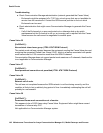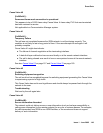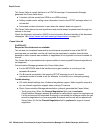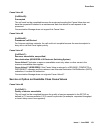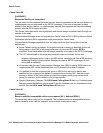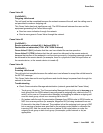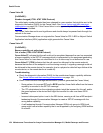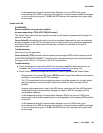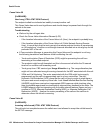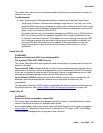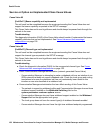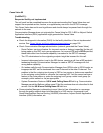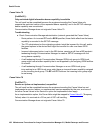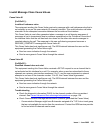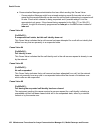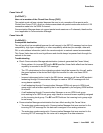
Denial Events
156 Maintenance Procedures for Avaya Communication Manager 3.0, Media Gateways and Servers
Cause Value 59
[0x3B/0xBB] -
User busy (1TR6: AT&T ISDN Protocol)
The endpoint called has indicated an inability to accept another call.
This Cause Value has end-to-end significance and should always be passed back through the
network to the user.
Troubleshooting
● Wait and try the call again later.
● Check the Cause Value Information Element (LOC)
- If the Location Information of the Cause Value is 0 (User), the endpoint is probably busy.
- If the Location information of the Cause Value is 4 (Public Network Serving Remote
User), it is most likely that the trunk group to the remote endpoint location is experiencing
an “all trunks busy” condition or not enough channels allocated into a virtual group for the
particular NSF of the call.
● If Communication Manager is generating this Cause Value and the endpoint is not busy,
the following translations and features could be affecting the call:
- Trunk and/or station Class of Restriction (COR) might be preventing the call from
terminating at the called endpoint.
- The endpoint might be call-forwarded and this is the second call within the 30-second
time limit on a station call forwarding a call.
- Trunk group form: CBC service type: Usage Allocation is y. The usage allocation plan
might not have allocated enough incoming channels for the NSF associated with this call.
- VDNs and Call Vectoring: The vector associated with the VDN might be incorrectly
programmed and the call is inappropriately sent to a busy vector step. The skill/
Automatic Call Distribution (ACD) group that the call is trying to queue to might have a
full queue and cannot accept any more calls. Look Ahead Interflow/Best Service Routing
(LAI/BSR) might have received an inappropriate ISDN response while checking other
sites for available agents and has inadvertently returned busy feedback to the caller. The
LAI/BSR attempt might be interacting with the public network features Egress on busy –
overflow to POTS, Alternate Destination Routing (ADR), or Alternate Destination Call
Redirection (ADCR). Analyze the vector processing of the call and the call flow to
determine where the failure is occurring.
Cause Value 61
[0x3D/0xBD] -
Incoming calls barred (1TR6: AT&T ISDN Protocol)
The call could not complete because the called user is not allowed to accept the call delivered in
the SETUP message.



